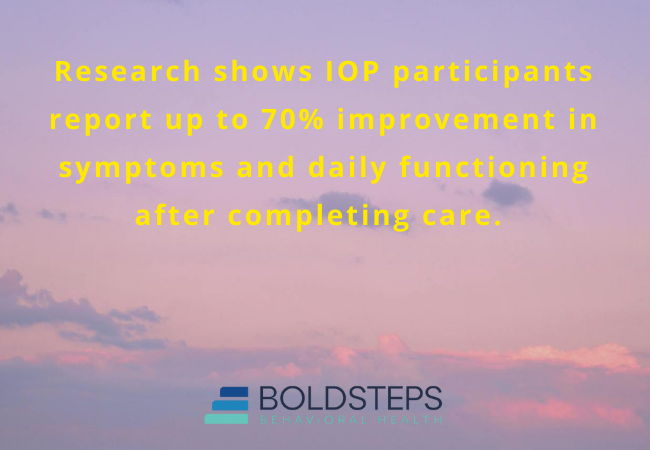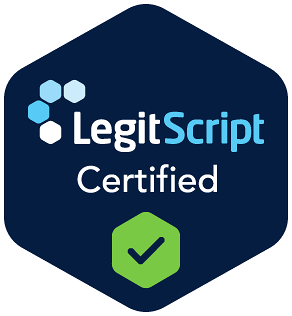When you’re ready to take control of your mental health or overcome addiction, it’s important to choose a treatment option that fits your needs — clinically and practically. While inpatient programs offer intensive care, they often require a full-time commitment that may not be feasible for everyone.
That’s where Intensive Outpatient Programs (IOP) come in. For many individuals in New Hampshire, IOP provides the best of both worlds: high-quality, structured treatment with the flexibility to maintain work, school, or family life.
At Bold Steps New Hampshire, our IOP combines clinical excellence, convenience, and compassionate care. If you’re wondering whether IOP is the right next step for your recovery journey, this in-depth guide will help you make an informed decision.
We’ll explore:
- What IOP is and what it involves
- How IOP compares to other levels of care
- Who benefits most from IOP
- What treatment looks like day to day
- How IOP supports long-term recovery
- How to access IOP in Concord and across the state through in-person and Virtual Treatment Programs in New Hampshire
What Is an Intensive Outpatient Program (IOP)?
An Intensive Outpatient Program is a structured, part-time treatment program designed for individuals who need more support than traditional outpatient therapy but do not require 24-hour supervision or hospitalization.
At Bold Steps New Hampshire, our IOP helps clients manage:
- Depression
- Anxiety
- Bipolar disorder
- Post-traumatic stress disorder (PTSD)
- Substance use and co-occurring disorders
IOP typically includes:
- 3 to 5 days per week of programming
- Individual therapy, group therapy, and family sessions
- Psychiatric services and medication management
- Education and skills training (e.g., mindfulness, stress management, relapse prevention)
Clients in IOP live at home, attend scheduled sessions at our Concord location or virtually, and continue working, studying, or caring for their families while receiving clinically effective support.
How IOP Compares to Other Treatment Levels
Finding the right level of care is crucial for effective recovery. Here’s how IOP compares to other options:
Inpatient or Residential Treatment
- 24/7 supervision and support
- Recommended for people with acute symptoms or safety concerns
- Disrupts daily life significantly (time away from work/school/home)
Partial Hospitalization Program (PHP)
- Typically 5–6 hours/day, 5 days/week
- Structured day treatment without overnight stay
- A good option for people stepping down from inpatient care
Intensive Outpatient Program (IOP)
- 3–5 days/week, 3–4 hours/day
- Designed for people who need support but can manage basic daily functioning
- Ideal for transitioning from PHP or stepping up from standard therapy
Outpatient Treatment Program New Hampshire
- 1–2 sessions per week
- Best for mild symptoms or post-IOP maintenance
Virtual Treatment Program New Hampshire
- Telehealth sessions for individual or group therapy
- Offers flexibility for people who live remotely or have time limitations
Who Is a Good Candidate for IOP?
You might be a strong candidate for IOP at Bold Steps New Hampshire if:
1. You need structured care but not 24/7 supervision
If your symptoms are moderate and you’re able to maintain daily responsibilities, IOP may be a perfect fit.
2. You’re stepping down from higher care
IOP is an excellent bridge for clients transitioning out of our Partial Hospitalization Program in New Hampshire or inpatient care. It helps reinforce what you’ve learned while rebuilding your routine.
3. You’ve tried weekly therapy and need more
If traditional outpatient therapy hasn’t been enough, IOP’s increased intensity and peer support can provide the additional help you need.
4. You need flexibility to maintain life responsibilities
Balancing work, family, or school while healing is possible with the scheduling flexibility IOP provides.
5. You’re committed to change but need help staying on track
IOP offers the accountability and tools needed to stay on the path toward mental wellness and sobriety.
How IOP Compares to Other Treatment Levels
| Program Type | Care Level | Ideal For |
|---|---|---|
| Inpatient/Residential | 24/7 medical and therapeutic support | Severe mental health or addiction crises |
| Partial Hospitalization Program | 5-6 hours/day, 5 days/week | Those needing structured daytime care but no overnight stay |
| Intensive Outpatient Program | 3-5 days/week, 3-4 hours/day | Moderate symptoms, stepping down from inpatient/PHP, or balancing treatment with life |
| Outpatient Treatment Program | 1-2 sessions/week | Maintenance, relapse prevention, or mild conditions |
| Virtual Treatment Program | Remote care via telehealth | Accessibility and flexibility for those with transportation or time constraints |
What to Expect from IOP at Bold Steps New Hampshire
Our Intensive Outpatient Programs in New Hampshire are customized to your specific needs. Here’s a look at what treatment may include:
Therapy Sessions
- Individual therapy: One-on-one sessions with licensed therapists to explore core issues and treatment goals.
- Group therapy: Facilitated peer sessions that address shared experiences, coping strategies, and emotional resilience.
- Family therapy: Rebuild communication and support systems at home.
Clinical and Psychiatric Support
- Regular meetings with psychiatric providers for diagnosis, medication assessment, and care planning.
Skills-Building Workshops
- Sessions on mindfulness, emotion regulation, stress reduction, relapse prevention, and cognitive restructuring.
Flexible Scheduling
- Morning, afternoon, and evening tracks
- Virtual options through our Virtual Treatment Program New Hampshire
Specialized Tracks within IOP
At Bold Steps New Hampshire, we tailor care depending on your primary needs:
IOP for Mental Health Treatment in New Hampshire
- Designed for clients struggling with mood disorders, trauma, or anxiety
- Evidence-based therapies like CBT, DBT, and trauma-focused care
- Helps clients stabilize emotionally and reintegrate into work or family life
IOP for Addiction Treatment in New Hampshire
- Ideal for individuals in early recovery
- Focuses on relapse prevention, triggers, and building a sober support network
- Includes coordination with medical detox when necessary

How IOP Integrates with Real Life
One of the most valuable features of IOP is that it allows you to heal in the context of your everyday life. At Bold Steps, we support this through:
- Applied skill development: Clients practice coping strategies in their real-world environment between sessions.
- Community integration: Clients build healthy routines and connections outside of treatment.
- Ongoing support: Weekly goal-setting and progress check-ins keep you focused.
- Hybrid access: The Virtual Treatment Program in New Hampshire makes it easier to stay engaged even when traveling or unable to attend in person.
What Happens After IOP?
IOP isn’t the end of care — it’s a critical milestone in an ongoing journey. After completing IOP, Bold Steps New Hampshire provides:
- Step-down to outpatient therapy
- Continued medication management
- Referrals to support groups and aftercare resources
- Alumni check-ins and community connection
- Access to virtual services for ongoing therapy
Recovery is not a linear path — and our goal is to ensure you’re supported every step of the way.
Why Choose Bold Steps New Hampshire?
At Bold Steps New Hampshire, we understand that healing isn’t one-size-fits-all. That’s why we offer flexible, individualized care built around your needs — not the other way around.
Whether you’re managing a mental health condition, recovering from substance use, or dealing with both, our team is here to walk alongside you with compassion, expertise, and clarity. Here’s what makes us different:
-
Customized Treatment Plans: Every person’s journey is unique. Our IOP and broader programs are tailored to your specific goals, challenges, and lifestyle.
-
Full Continuum of Care: We offer step-up and step-down options, including our Partial Hospitalization Program, Outpatient Program, and Virtual Treatment Program in New Hampshire, ensuring you always have the right level of support.
-
Evidence-Based Therapies: Our clinicians are trained in CBT, DBT, trauma-informed care, relapse prevention, and more — all proven to promote long-term recovery.
-
Flexible Scheduling and Remote Access: Treatment should fit into your life, not interrupt it. We offer both in-person and virtual care options so you can recover without stepping away from work, school, or family.
-
A Local, Dedicated Team: Based in Concord, NH, we’re deeply rooted in the community. We understand the unique challenges New Hampshire residents face and we’re committed to helping you thrive here.
At Bold Steps, we treat the whole person — not just the diagnosis. And we’re here to support your growth every step of the way.
Conclusion
If you’ve been struggling with your mental health, addiction, or both — but aren’t sure where to begin — consider this your sign to take the next step.
Our Intensive Outpatient Programs in New Hampshire are designed for people just like you: individuals ready to heal but still living full, busy lives. Whether you’re stepping down from inpatient care or stepping up from outpatient therapy, IOP offers the structure, support, and freedom you need to recover on your terms.
We know that change is hard. But you don’t have to do it alone. Call Bold Steps New Hampshire today at (603) 915-4223 to schedule your confidential consultation. We’ll help you decide if IOP is right for you — and guide you toward a treatment plan that works with your life, not against it. Healing starts with one bold step. Let’s take it together.
FAQ Intensive Outpatient Programs in New Hampshire
What is an Intensive Outpatient Program (IOP)?
An IOP is a flexible, part-time treatment program for people with mental health or addiction issues. It includes multiple weekly therapy sessions while allowing clients to live at home and maintain responsibilities like work or school.
How is IOP different from inpatient or PHP care?
IOP offers more flexibility than inpatient or Partial Hospitalization Programs (PHP), which require daily or 24-hour attendance. IOP typically involves 3–5 sessions a week for a few hours each day and is ideal for individuals with moderate symptoms and stable living environments.
Can I attend IOP virtually?
Yes. Our Virtual Treatment Program in New Hampshire allows you to participate in IOP through secure telehealth platforms, providing added convenience and accessibility.
Does insurance cover IOP?
Most insurance providers offer coverage for IOP. Our admissions team will work directly with you to verify your benefits and help you understand your financial options.
How long does IOP last?
Most IOP programs last between 6 and 12 weeks, depending on your clinical needs, goals, and progress.
What happens after IOP?
After IOP, clients often transition into our Outpatient Treatment Program for continued support, or continue therapy through our virtual platform. We also offer aftercare planning and alumni support.
Can I work or attend school during IOP?
Yes. One of the key advantages of IOP is that it allows you to maintain your work, school, or caregiving commitments while receiving treatment.


